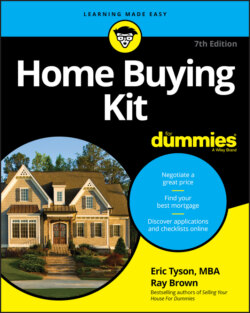Читать книгу Home Buying Kit For Dummies - Eric Tyson - Страница 67
Investments for five years or less
ОглавлениеMost prospective home buyers aren’t in a position to take many risks with their down-payment money. The sooner you expect to buy, the less risk you should take. Unless you don’t expect to buy for at least five years, you shouldn’t even consider investing in more growth-oriented investments, such as stocks.
Although it may appear boring, the first (and likely best) place for accumulating your down-payment money is in a money market mutual fund. As with bank savings accounts, money market mutual funds don’t put your principal at risk — the value of your original investment (principal) doesn’t fluctuate. Rather, you simply earn interest on the money that you’ve invested. Money market funds invest in supersafe investments, such as Treasury bills, bank certificates of deposit, and commercial paper (short-term IOUs issued by the most creditworthy corporations).
If you really want to save through a bank, shop, shop, shop around. Smaller savings and loans and credit unions tend to offer more competitive yields than do the larger banks that spend gobs on advertising and have branches all around. Remember, more overhead means lower yields for your money.
In addition to higher yields, the best money market funds offer check writing (so you can easily access your money) and come in tax-free versions. If you’re in a higher income tax bracket, a tax-free money market fund may allow you to earn a higher effective yield than a money fund that pays taxable interest. (Note: You pay tax only on money invested outside tax-sheltered retirement accounts.) When you’re in a high tax bracket (refer to Table 3-2 earlier in this chapter), you should come out ahead by investing in tax-free money market funds. If you reside in a state with high income taxes, consider a state money market fund, which pays interest that’s free of both federal and state tax.
The better money market funds also offer telephone exchange and redemption and automated, electronic exchange services with your bank account. Automatic investment comes in handy for accumulating your down payment for a home purchase. Once per month, for example, you can have money zapped from your bank account into your money market fund.
Because a particular type of money market fund (general, Treasury, or tax-free municipal) is basically investing in the same securities as its competitors, opt for a fund that keeps lean-and-mean expenses. A money fund’s operating expenses, which are deducted before payment of dividends, are the major factor in determining its yield. As with the high overhead of bank branches, the higher a money fund’s operating expenses, the lower its yield. We recommend good ones in this section.
When you’re not in a high federal-tax bracket, and you’re not in a high state-tax bracket (that is, you pay less than 5 percent in state taxes), consider the following taxable money market funds for your home-down-payment money:
Fidelity Government Cash Reserves ($0 to open)
Vanguard Prime Money Market ($3,000 to open)
You can invest in a money market fund that invests in U.S. Treasury money market funds, which have the backing of the U.S. federal government — for what that’s worth! From a tax standpoint, because U.S. Treasuries are state-tax-free but federally taxable, U.S. Treasury money market funds are appropriate when you’re not in a high federal-tax bracket but you are in a high state-tax bracket (5 percent or higher). Should you choose to invest in a money market fund that invests in the U.S. Treasury, consider these:
Fidelity Government Money Market ($0 to open)
USAA Treasury Money Market ($3,000 to open)
Vanguard Federal Money Market ($3,000 to open)
Municipal (also known as muni) money market funds invest in short-term debt (meaning that it matures within the next few years) issued by state and local governments. A municipal money market fund, which pays you federally tax-free dividends, invests in munis issued by state and local governments throughout the country. A state-specific municipal fund invests in state and local government-issued munis for one state, such as New York. So if you live in New York and buy a New York municipal fund, the dividends on that fund are generally free of both federal and New York state taxes.
So how do you decide whether to buy a nationwide or state-specific municipal money market fund? Federal-tax-free-only money market funds are appropriate when you’re in a high federal-tax bracket but not a high state-tax bracket (less than 5 percent). Your state may not have good (or any) state-tax-free money market funds available. If you live in any of those states, you’re likely best off with one of the following national money market funds:
Fidelity Municipal Money Market Fund ($0 to open)
T. Rowe Price Summit Municipal Money Market ($25,000 to open)
Vanguard Tax-Exempt Money Market ($3,000 to open)
State-tax-free money market funds are appropriate when you’re in a high federal-tax bracket and a high state-tax bracket (5 percent or higher). Contact fund companies listed in the sidebar “Getting in touch with mutual fund companies” to see whether they offer a money fund for your state.
